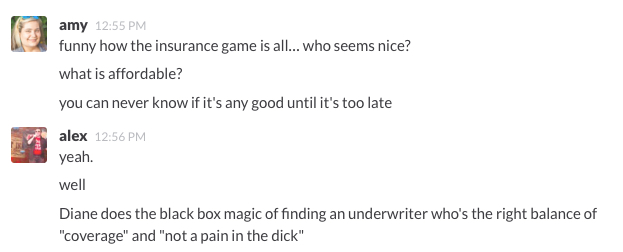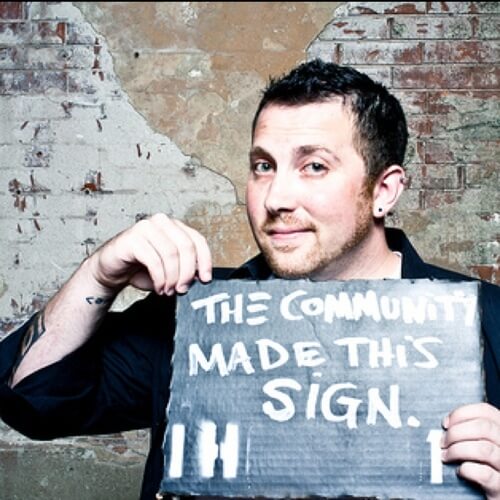Insurance. A service you pay for that you literally hope you never need to use.
And even worse, there’s no way to know how good your policy is until it’s too late. There’s not really a way to kick the tires.
I was talking with my biz partner (not Indy Hall – this other thing I do) Amy about this as she was simultaneously dealing with a leaky roof in her 270+ year old home and preparing to get insurance for her business’ new office buildout.

For coworking spaces, getting insurance is doubly difficult…at least.
If you’ve set out on the path of starting a coworking space, you’ve probably found yourself needing to get insurance in order to sign a lease. Most commercial landlords require your business to carry at least a couple million dollars in liability coverage, and some require the same or more in other categories.
But if you call most insurance agents and tell them about your new office, you’re going to start getting quotes that seem outrageous.
And that’s if you even get that far. A lot of agents are literally just plugging your information into a computer program, so they’re thoughtlessly asking you for EVERY piece of information instead of the most relevant details about your coworking space, how it operates, etc.
After dozens of agents who didn’t have a clue, I lucked out and found an AMAZING agent who helped us get the coverage we need. That includes:
- Our general liability policy
- Coverage that allows other special events, on-site and off
- Coverage that allows us to have alcohol at our events, on site and off-site (naturally we need to be law-abiding and cannot SELL alcohol or serve minors)
And a whole lot more. Over the years I’ve periodically called her with questions about one-off events that needed a policy, and she was able to save us money by showing how our existing policy already covered it. She’s gotten used to my strange requests, and even knows what to push back on.
(No, Alex, no slides. No fireman’s pole. No bouncy castle).
I recently asked her why she’s was able to help us when other insurance agents seem to struggle. She said:
The problem that other agents have with quoting coworking spaces is that most insurance companies do not have an actual “cookie cutter” insurance classification available that fits a coworking operation and most agents don’t have a grasp on the understanding of the coworking operation which in turn, results in underwriters not having a clear understanding of the operation.
When the underwriters are not forced to “think outside the box” to see that a coworking operation will qualify for a different class code than a lessor’s risk class code, they nor their quoting system will allow it, resulting in preposterous premiums that do not accurately reflect the risk.
Thanks to working with you I have an understanding of how the coworking spaces operate and what it entails. In turn, I have taught some of my specific underwriters to have the same understanding, and to see things my way.
See why Diane is awesome?
She knows that she’ll sell more insurance policies if she takes the time to really understand who her customers are and what they actually need. Instead of retrofitting what she knew (or thinks she knew) about shared offices, she actually got to know our business and learned how to communicate it to an underwriter.
Frankly, Diane has done more work to understand coworking than most people do…including the ones who put a bunch of desks and chairs in a room and call it coworking.
She could’ve just gotten me the cheapest policy. But would I have the coverage I actually need? Most definitely not.
She could have gotten me the most comprehensive policy, covering all of my bases including the ones I hadn’t thought of before. But how much money would I be wasting on our coverage? A ton.
All she had to do is go a step above checking the boxes in a piece of software and actually THINK about the questions she was asking me. And not only did she get one happy (and properly insured) client…but I’ve referred her to countless other people.
And if you run a coworking space – or are opening one soon – you can learn a thing or two from Diane
Rather than checking the boxes of what you think a shared workspace should be, ask your community questions. Practice Tummling. Don’t just seek out what they want, find out what they care about (and why). Get them involved.
When you do, you’ll start to see your members become as loyal as I am to my insurance agent Diane.
 I am always thinking about the intersection of people, relationships, trust and business. I founded
I am always thinking about the intersection of people, relationships, trust and business. I founded